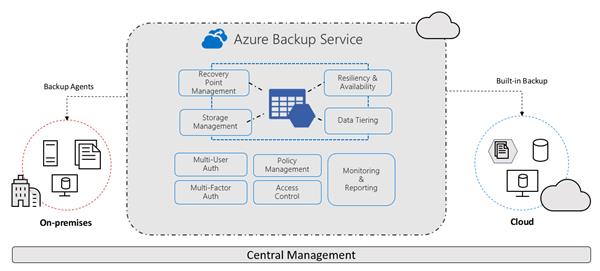What is azure backup?
What can I back up?
- On-premises - Back up files, folders, system state utilizing the Microsoft Azure Recovery Services (MARS) agent. Or use the DPM or Azure Backup Server (MABS) agent to protect on-premises VMs (Hyper-V and VMWare) and other on-premises workloads
- Azure VMs - Back up entire Windows/Linux VMs (utilizing backup extensions) or back up files, folders, and system state using the MARS agent.
- Azure Files shares - Back up Azure File shares to a storage account
- SQL Server in Azure VMs - Back up SQL Server databases running on Azure VMs
- SAP HANA databases in Azure VMs - Backup SAP HANA databases running on Azure VMs

Azure Backup delivers these key benefits:
Offload on-premises backup: Azure Backup offers an easy solution for backing up your on-premises resources to the cloud. Get short and long-term backup without the necessity to deploy complex on-premises backup solutions.
Back up Azure IaaS VMs: Azure Backup provides independent and isolated backups to protect against accidental destruction of original data. Backups are stored during a Recovery Services vault with built-in management of recovery points. Configuration and scalability are simple, backups are optimized, and you'll easily restore as required
Scale easily - Azure Backup utilizes the basic force and boundless size of the Azure cloud to convey high-accessibility with no support or observing overhead.
Get unlimited data transfer: Azure Backup doesn't limit the quantity of inbound or outbound data you transfer or charge for the info that's transferred.
Outbound information alludes to information moved from a Recovery Services vault during a reestablish activity.
If you perform an offline initial backup using the Azure Import/Export service to import large amounts of knowledge. there is a cost related to inbound data.
Keep data secure: Azure Backup gives answers for making sure about the information on travel and very still.
Centralized monitoring and management: Azure Backup provides built-in monitoring and alerting capabilities during a Recovery Services vault. These capabilities are available with none additional management infrastructure. you'll also increase the size of your monitoring and reporting by using Azure Monitor.
Get app-consistent backups: An application-consistent backup means a recovery point has all required data to revive the backup copy. Azure Backup provides application-consistent backups, which ensure additional fixes aren't required to revive the info. Reestablishing application-reliable information decreases the reclamation time, permitting you to rapidly come back to a running state.
Retain short and long-term data: you'll use Recovery Services vaults for short-term and long-term data retention.
Automatic storage management - Hybrid environments often require heterogeneous storage - some on-premises and a few within the cloud. With Azure Reinforcement, there is no expense for utilizing on-premises stockpiling gadgets. Azure Reinforcement naturally distributes and oversees reinforcement stockpiling, and it utilizes a pay-as-you-use model. So you simply buy the storage you consume.
Multiple storage options - Azure Backup offers two sorts of replication to stay your storage/data highly available.
Locally redundant storage (LRS) replicates your data 3 times (it creates three copies of your data) during a storage scale unit during a datacenter. All copies of the info exist within an equivalent region. LRS may be a low-cost option for shielding your data from local hardware failures.
Geo-redundant storage (GRS) is the default and recommended replication option. GRS replicates your data to a secondary region (hundreds of miles faraway from the first location of the source data). GRS costs quite LRS, but GRS provides a better level of durability for your data, albeit there is a regional outage.




